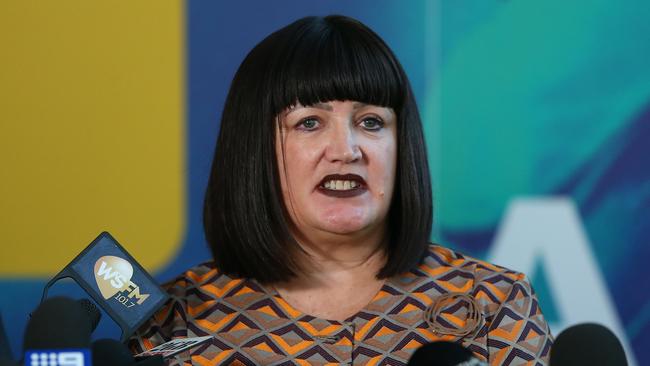Rugby Australia ‘strong’ despite global plan axing
RA chief executive believes the game can ride out the failure of the Nations Championship.

Rugby Australia chief executive Raelene Castle believes the game in this country can ride out the economic hit of the abandonment of the mooted 12-year $9.2 billion Nations Championship, even as it becomes apparent Australia would never have seen an even split of the funding.
The global tournament, which was to have begun in 2022 if all 12 nations — the Six Nations in the north and the four members of The Rugby Championship in the south, plus Japan and Fiji—– was formally abandoned yesterday when World Rugby, which has kept the idea alive on life-support over recent months, finally agreed that it had expired.
“Despite strong progress in collaboration with unions, competition owners and international rugby players, including full engagement on the detailed process of financial due diligence, a lack of consensus on key issues, particularly the timing and format of promotion and relegation, left World Rugby with no alternative but to discontinue the project,” a World Rugby statement announced yesterday.
There is no doubt that the resistance of Italy, Ireland and Scotland, who had taken a negative mindset from the start, particularly to the issue of promotion-relegation, doomed the brainchild of World Rugby deputy chairman Gus Pichot, but The Australian understands wider factors were also involved.
As the deal progressed, it became obvious the Six Nations members would not agree to a neat split of the $9.2 billion offered by InFront Sports and Media. It is understood northern hemisphere nations argued that since they had the more substantial television markets, they deserved a bigger slice of the cake.
The numbers bounced around in the early stages — basically the sum total divided 12 ways over 12 years — did not long survive these objections. Suddenly, the actual numbers didn’t look as appealing as the initial back-of-the-coaster figures first presented.
It is also understood SANZAAR became increasingly frustrated with World Rugby, which had made arbitrary decisions about revenue-splitting but had not allowed the respective countries to get to the table to negotiate all the elements of the deal.
Still, as SANZAAR chairman Brett Impey stated yesterday, the Nations Championship represented a “golden opportunity to grow the game internationally” as it had provided an entry into the top league for Japan and Fiji into The Rugby Championship and a means of promotion for other Tier Two countries down the track.
It may well be that SANZAAR establishes a framework that nations seeking entry into The Rugby Championship can meet, but certainly not by the start of the new broadcast deal in 2022. A mid-cycle or even end-of-cycle entry date looms as more realistic.
The cancellation of the Nations Championship robs RA of a massive windfall at a time when it is being pinned by economic factors. Not only are Super Rugby crowds on the wane, but its primary broadcaster, Fox Sports, has been forced to look at its business and work out which parts can be trimmed. The National Rugby Championship looms as a likely hit.
Castle insisted, however, that RA had been planning for two eventualities — the Nations Championship coming off and the alternate reality that it fell over, in which case RA’s survival would depend on the SANZAAR broadcast deal. The current deal is worth $285m to RA over five years.
“That’s the work we’ve been doing in parallel with the World Nations Championships and Super Rugby ... we are confident that we will offer an option for broadcasters across the SANZAAR network (that is the Australian, NZ and South African markets primarily) that will see us in a strong position,” Castle said.


